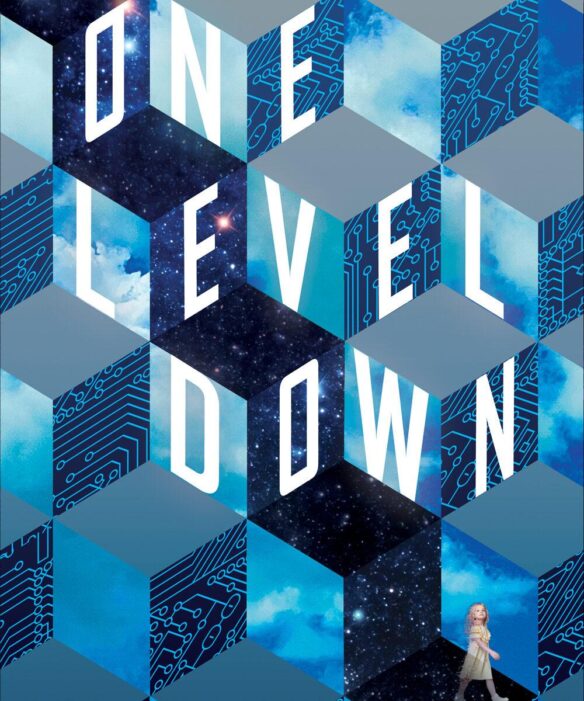
- One Level Down by Mary G. Thompson (Tachyon Press, 2025)
By Jennifer Stevenson: This I also swallowed at a sitting. It’s about women, it ends well, and it is science fiction, I guess, if stories about multiverses created by immense computers and about the computerized copies of humans who live in them are science fiction.
One Level Down set me off on a long train of thought about the difference between science fiction’s exploration of multiverse artifacts and the people who prefer to live in them, and the primordial soup of universes, or planes, as medieval and Victorian occult thinkers referred to them.
A major difference between these two sorts of universes is that the science fictional multiverses are man-made and man-managed for the profit of corporate interests and are, to all intents and purposes, “all in your head.” In Thompson’s story, the characters have chosen to feel pain but to be forever young and healthy, to feel hunger and practice agriculture but not to require food. Travel between multiverses is a matter of technology, a process discovered by humans in the late 20th Century whose discovery implies that our own universe, which we have taken for reality, whatever that is, is also constructed, artificial, mutable in many heretofore impossible ways, and far from singular.
The scientia of the medievals had a divine Designer who was not (in theory) focused on profits. Manifested by all nature, scientia was a seamless amalgam of all branches of human knowledge, interconnectedness, awareness, virtue, and love. Note the addition of moral components. The Victorians added a denser, secular overlay of Jewish mysticism, which focused on the exploitation of the five senses and their replication at higher and higher planes of energy, emotion, thought, and spirituality for the benefit of travelers between universes, or planes of creation. The Victorian and medieval alike required the traveler to attain mental clarity, sharp focus, firmness of purpose, and purity of intention before attempting travel between universes.
The primordial soup at its highest level, in Jewish mysticism, is a chaotic jumble of all forms, patterns, shapes, particles, waves; there is no time. Time is constructed as soon as we have bodies which have needs that expect effect to follow cause, and senses that irrevocably slice our perception into narrow layers of vibration: sight, sound, smell, taste, touch. The soup is everywhere, nor do we ever leave it. Even if we can become aware of all the soup, we perceive it, that is, organize it, in layers that correspond to our senses. The rest is outside our reality. That’s the point of having bodies. From the perspective of that soup, our bodies are a thought experiment in dissecting the soup into bits that will fit on a slide under a microscope.
Thompson’s heroine Ella has been physically arrested at five years old, but mentally she is 58. Her father, who signed the original contract with the corporation that owns the planet and the universe in which everyone around her lives, is a batshit megalomaniac. She likes some of the other people in their frontier community, but she wants out. As she learns about the version of herself who predated her – Daddy’s real daughter, who died at five when the colonists first arrived on this colony – and the fates of Daddy’s first and second wives, Ella discovers how fine are the splits between dead real Ella, herself (real Ella’s virtual copy), an Ella who escapes the colony and Daddy’s oppressive parenting, and an Ella who is re-downloaded as an offering to Daddy so that he’ll soften his tyranny over the other colonists and allow their virtual bodies to become pregnant with their own virtual children.
What is real? If we can create virtual copies of real people, then it follows that we also are on some level simulations, working out vast thought experiments to benefit the curiosity of unthinkable powers.
Thompson doesn’t go so far as to postulate those unthinkable powers. She leaves us somewhere in the middle, facing the choices we make: to do away with disease but keep pain, to live forever but be subject to deletion by system operators at higher levels, to live in a universe that’s a war game, or where the rivers flow with chocolate, or where we could do away with death and want only we don’t.
This is not where the science fiction of my youth would leave the reader. Those heroes would get into a teeny spaceship and, like Spock firing himself through that immense vaginal doorway to the point of origin, wrest the secrets of everything from the beyond. That stuff frankly bores me.
Thompson keeps the reader here, where we make the smaller choices that lead us down ever-bifurcating trousers of time. And like a good medieval scientist, she keeps our eye on the moral component.
Jennifer Stevenson’s Trash Sex Magic was shortlisted for the Locus First Fantasy Novel Award and longlisted for the Nebula two years running. Try her romantic fantasy series Hinky Chicago, which is up to five novels, her paranormal romances Slacker Demons, which are about retired deities who find work as incubi, or her paranormal women’s fiction series Coed Demon Sluts, about women solving life’s ordinary problems by becoming succubi. She has published more than 20 short stories.
Find Jennifer at the Book View Cafe blog, at the second row at fast roller derby bouts in Chicago, or on Facebook.
Discover more from File 770
Subscribe to get the latest posts sent to your email.

Pingback: AMAZING NEWS FROM FANDOM: April 27, 2025 - Amazing Stories